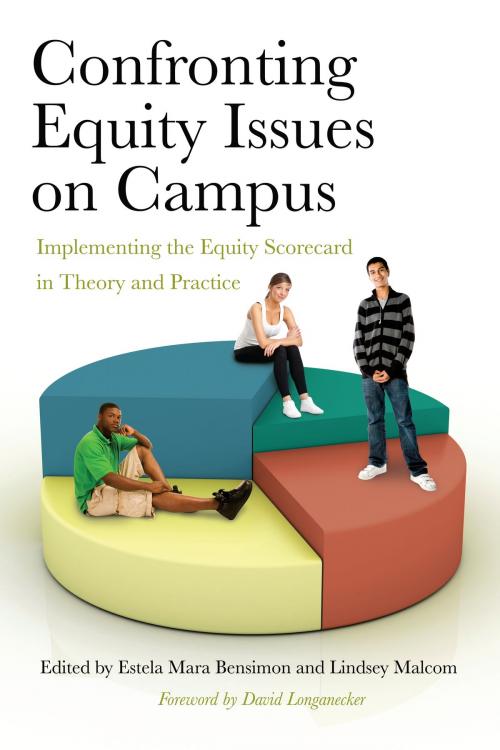Confronting Equity Issues on Campus
Implementing the Equity Scorecard in Theory and Practice
Nonfiction, Reference & Language, Education & Teaching, Educational Theory, Multicultural Education, Higher Education| Author: | ISBN: | 9781579227104 | |
| Publisher: | Stylus Publishing | Publication: | March 27, 2012 |
| Imprint: | Stylus Publishing | Language: | English |
| Author: | |
| ISBN: | 9781579227104 |
| Publisher: | Stylus Publishing |
| Publication: | March 27, 2012 |
| Imprint: | Stylus Publishing |
| Language: | English |
"This volume examines how colleges and universities are using the Center for Urban Education's Equity Scorecard to create racial equity on campus. With in-depth examinations of the Equity Scorecard process as well as reflections from practitioner teams and researchers, the book is a testament to the role thoughtful data assessment can play in generating more racially equitable outcomes for students. The book calls educators and administrators to take personal responsibility for their roles in moving from deficit model to an equity model, and provides helpful context for anyone currently using or considering the scorecard as a tool for change."?Diversity & Democracy
How can it be that 50 years after the passage of the Civil Rights Act, our institutions of higher education have still not found ways of reducing the higher education gaps for racial and ethnic groups?
That is the question that informs and animates the Equity Scorecard model of organizational change. It shifts institutions’ focus from what students do (or fail to do) to what institutions can do—through their practices and structures, as well as the actions of their leaders and faculty—to produce equity in outcomes for racially marginalized populations. Drawing on the theory of action research, it creates a structure for practitioners to become investigators of their own institutional culture, to become aware of racial disparities, confront their own practices and learn how things are done on their own turf to ask: In what ways am I contributing to equity/inequity?
The Scorecard can be used at a small-scale to analyze individual courses or programs, as well as broader institutional issues.
How can it be that 50 years after the passage of the Civil Rights Act, our institutions of higher education have still not found ways of reducing the higher education gaps for racial and ethnic groups?
That is the question that informs and animates the Equity Scorecard model of organizational change. It shifts institutions’ focus from what students do (or fail to do) to what institutions can do—through their practices and structures, as well as the actions of their leaders and faculty—to produce equity in outcomes for racially marginalized populations. Drawing on the theory of action research, it creates a structure for practitioners to become investigators of their own institutional culture, to become aware of racial disparities, confront their own practices and learn how things are done on their own turf to ask: In what ways am I contributing to equity/inequity?
The Scorecard can be used at a small-scale to analyze individual courses or programs, as well as broader institutional issues.
"This volume examines how colleges and universities are using the Center for Urban Education's Equity Scorecard to create racial equity on campus. With in-depth examinations of the Equity Scorecard process as well as reflections from practitioner teams and researchers, the book is a testament to the role thoughtful data assessment can play in generating more racially equitable outcomes for students. The book calls educators and administrators to take personal responsibility for their roles in moving from deficit model to an equity model, and provides helpful context for anyone currently using or considering the scorecard as a tool for change."?Diversity & Democracy
How can it be that 50 years after the passage of the Civil Rights Act, our institutions of higher education have still not found ways of reducing the higher education gaps for racial and ethnic groups?
That is the question that informs and animates the Equity Scorecard model of organizational change. It shifts institutions’ focus from what students do (or fail to do) to what institutions can do—through their practices and structures, as well as the actions of their leaders and faculty—to produce equity in outcomes for racially marginalized populations. Drawing on the theory of action research, it creates a structure for practitioners to become investigators of their own institutional culture, to become aware of racial disparities, confront their own practices and learn how things are done on their own turf to ask: In what ways am I contributing to equity/inequity?
The Scorecard can be used at a small-scale to analyze individual courses or programs, as well as broader institutional issues.
How can it be that 50 years after the passage of the Civil Rights Act, our institutions of higher education have still not found ways of reducing the higher education gaps for racial and ethnic groups?
That is the question that informs and animates the Equity Scorecard model of organizational change. It shifts institutions’ focus from what students do (or fail to do) to what institutions can do—through their practices and structures, as well as the actions of their leaders and faculty—to produce equity in outcomes for racially marginalized populations. Drawing on the theory of action research, it creates a structure for practitioners to become investigators of their own institutional culture, to become aware of racial disparities, confront their own practices and learn how things are done on their own turf to ask: In what ways am I contributing to equity/inequity?
The Scorecard can be used at a small-scale to analyze individual courses or programs, as well as broader institutional issues.















